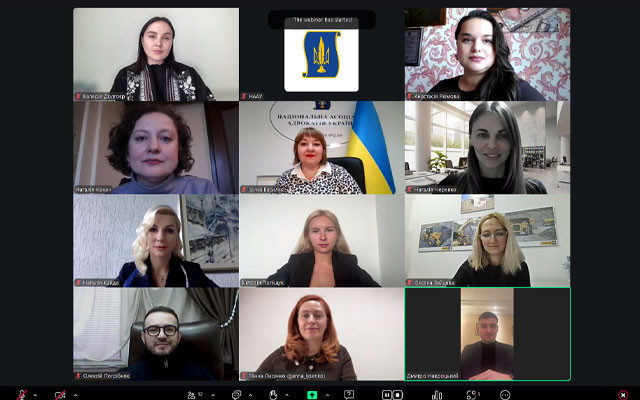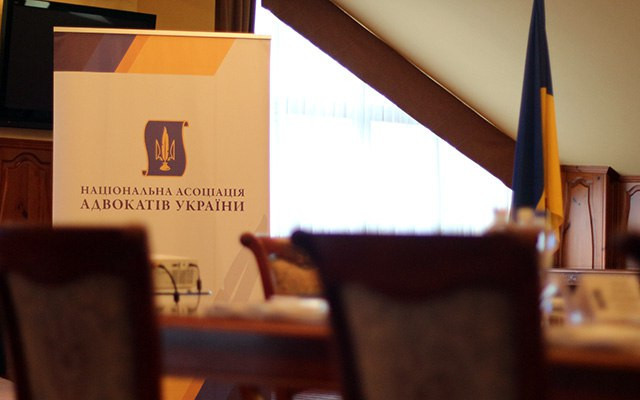Occupational safety during wartime: legal risks and employer liability

On October 21, the National Bar Association of Ukraine held a round table discussion on «Occupational safety in conditions of martial law». Participants discussed how the war has changed the requirements for safe working conditions, what guarantees remain for employees, and what responsibility employers bear for violations of legislation in this area.
The moderator of the event, chairman of the UNBA Committee on labor law Viktoria Polishchuk, emphasized that the topic of occupational safety requires renewed attention in the context of military risks and mass displacement of workers. Legislative changes adopted in recent years have significantly adapted procedures, but in practice, conflicts arise between the obligations of employers and the objective circumstances of martial law.
How to pay?
After the war began, many employers did not understand how to act when employees stopped coming to work and businesses effectively ceased operations. Committee member Oleksiy Pogribnyak recalled that the Law «On the organization of labor relations under martial law» was subsequently adopted, which defined the order of operation of enterprises but did not regulate the issue of remuneration during the period when employees were in shelters.
The speaker analyzed the provisions of current legislation governing these relations, in particular the Law «On remuneration of labor», the Labor Code, the Law «On labor protection», and the Law «On collective agreements and contracts». He also drew attention to the Cabinet of Ministers' Resolution No. 221 of March 7, 2022, which gave the heads of state bodies and budgetary institutions the right to independently determine the amount of remuneration during downtime, but not less than two-thirds of the tariff rate.
O. Pogribnyak explained that the Labor Code provides for several approaches to remuneration in cases of downtime. If work is stopped through no fault of the employee due to circumstances of force majeure, remuneration shall be paid in an amount not less than two-thirds of the official salary. At the same time, the employee has the right to refuse to perform work if there is a danger to his life or health, including during an air raid alert.
The advocate highlighted three possible courses of action when an alarm is declared: continuing to work in a shelter with full pay; registering downtime with pay in accordance with Article 113 of the Labor Code; or transferring the employee to another job with their consent. He noted that most companies currently do not formally register downtime, but simply maintain wages for the time employees spend in shelters.
He drew particular attention to the role of collective agreements in regulating this issue. Sectoral agreements, particularly in the fields of culture and education, already contain recommendations on maintaining average earnings during the time employees spend in shelters, if this occurs during working hours. Therefore, enterprises should include such provisions in their collective agreements to avoid disputes with owners and regulatory authorities.
Summing up his speech, O. Pogribnyak noted that the issue of remuneration during employees' stay in shelters already has an established practice, and the choice of a specific form is up to the employer, who must ensure both the safety of employees and a fair approach to their remuneration.
Safe flexibility
The introduction of martial law has posed an unprecedented challenge for labor legislation: employers and employees are working under conditions of forced evacuation, constant anxiety, mobilization, destruction of infrastructure, and changes in reservations.
In these circumstances, according to Committee member Valeria Dolgoyer, the provisions of the law must be adapted to guarantee the right to safe working conditions.
She recalled that the Law «On the organization of labor relations under martial law» changed the approaches to the place of work and working time regimes in connection with the relocation of enterprises. At the same time, employers are not exempt from compliance with occupational safety requirements: Article 6 of this Law retains the prohibition of forced labor and the employee's right to safe and healthy working conditions in full.
V. Dolgoyer noted that recently there has been an increase in the number of occupational safety regulations in various industries, which establish requirements for the safety of work, inventory, and equipment, as well as for the activities of expert organizations. The key principle remains unchanged: the employer is responsible for safe working conditions, must create a safe environment, provide training and instruction, individual and collective protection equipment, and finance occupational safety measures. Permitted flexible formats (remote and mixed work) do not negate safety requirements — they must be adapted and properly communicated to employees.
The speaker also reminded the audience of the types of occupational safety briefings and the grounds for conducting them (start of work, transfer, break in work, changes in regulatory documents, performance of high-risk work, elimination of accidents, etc.).
To illustrate the importance of compliance with the requirements, the advocate cited court practice:
- a sentence upheld on appeal, in which a workshop manager was held criminally liable for allowing a person to work without proper documentation, medical examinations, training, and instruction, which led to death;
- a case concerning the death of an employee of a critical infrastructure facility as a result of an explosion, where the court found no violations on the part of the employer, as an official investigation had been conducted and the occupational safety documentation had been properly completed;
- the position of the Supreme Court in a dispute related to the suspension of employment due to the relocation of a medical facility and the inability to ensure safe working conditions — proper and safe conditions are defined as an important element of the performance of an employment contract.
Instruction under sirens
Committee member Natalia Kokhan focused on two areas of employer responsibility: conducting training and organizing shelters. She reminded that both parties to the employment relationship have not only rights but also direct obligations: the employee — to comply with labor and technological discipline, occupational safety standards, and local company regulations; employers must create safe and harmless working conditions, provide training and instruction, and, in conditions of martial law, organize temporary shelters for the proper performance of work.
In parallel with Article 13 of the Law «On occupational safety», which imposes on the employer the obligation to conduct occupational safety training, Article 40 of the Civil Protection Code obliges the employer to organize training on civil protection issues. For the occupational safety management system to function, the employer creates appropriate services (in particular, an occupational safety service), Committees if necessary, introduces job descriptions, and develops and approves regulations and instructions based on model acts. The employer is directly responsible for failing to take the necessary measures.
All employees, upon hiring and during the course of their work, undergo occupational safety training (including first aid training) at the employer's expense and are familiarized with the rules of conduct in case of accidents and natural disasters. Employees engaged in high-risk work, in accordance with the Model Regulations approved by Order of the State Committee for Occupational Safety and Health Supervision No. 15 of January 26, 2005, undergo special training and knowledge testing every year.
The section on training provides for introductory, initial, refresher, and, if necessary, unscheduled and targeted training. The frequency depends on the nature of the work. Each training session ends with a knowledge test, and the results are recorded in the training log.
Civil protection training takes place during working hours and at the employer's expense in accordance with the Procedure for Training the Population in Emergency Situations (Cabinet of Ministers Resolution No. 444 of June 26, 2013).
The organization of shelters is regulated by civil protection legislation. Protective structures include shelters, anti-radiation shelters, dual-purpose structures, and simple shelters, which form a single fund. The procedure for creating and maintaining the civil protection shelter fund, including objects in the fund and excluding such objects from the civil protection shelter fund, and keeping records of the fund was approved by Cabinet of Ministers Resolution No. 138 of March 10, 2017. The heads of entities are personally responsible for the accounting, inventory, proper maintenance, state registration of rights, and timely submission of reliable information about the objects of the fund.
Shelter options
Continuing her colleague's speech, Vice-Rector of the Higher School of Advocacy of the UNBA Iryna Vasylyk focused on practical issues of organizing shelters at enterprises. Today, the creation of safe premises is not only an element of civil protection, but also a direct obligation of the employer to protect employees not only from industrial but also from military risks.
Due to the lack of detailed legal regulation, employers are advised to implement practical solutions on their own. In particular, they should develop internal instructions or procedures for employees in the event of an air raid alarm. Such documents should specify the responsibilities of employees — to stop work, move to a shelter, indicate the location of shelters, the procedure for those who are away from their workplace when the alarm sounds, and confirm their familiarity with the instructions by signing them.
There are three main options for action at enterprises:
1) use of own protective structures (shelters, anti-radiation shelters, dual-purpose structures);
2) conclusion of an agreement with another enterprise on the use of its shelter;
3) sending employees to the nearest protective structures designated by local authorities.
The order approving the procedure for employees should provide for personal responsibility for failure to comply with safety requirements.
Separately, I. Vasilik drew attention to the specifics for educational institutions: they can conduct offline training only if they have their own shelters. The State Emergency Service has developed recommendations for organizing shelters for children, pupils, and students.
The speaker also emphasized the importance of equipping shelters with communication devices, ventilation, lighting, first aid kits, water supplies, and non-perishable food. Shelters must be regularly inspected, tested, and maintained in good condition. Constant communication between management and employees, evacuation drills, and updating internal documents help maintain emergency preparedness.
Ensure control
Committee member Natalia Kaida provided more details on the arrangement of shelters and bomb shelters at enterprises. She reminded that civil defense structures are created to protect people from hostilities, man-made accidents, and natural disasters, and therefore their proper maintenance and readiness is the direct responsibility of the enterprise manager, regardless of the form of ownership.
The procedure for setting up shelters involves a series of steps: selecting a location, conducting a technical survey, equipping the structure with life support systems, and regularly monitoring its condition. The manager must organize an annual inspection and check of the technical condition of the shelters, appoint a person responsible for their maintenance, develop an evacuation plan for employees, and keep a log of inspections.
The speaker drew attention to typical problems that arise during the implementation of these requirements and are transferred to the judicial sphere. She cited the position of the Supreme Court, set out in its ruling of January 23, 2025, which considered the issue of the balance holder's obligations to bring protective structures into proper technical condition. The court concluded that the territorial bodies of the State Emergency Service of Ukraine do not have the authority to bring such claims to court, and their right to appeal the inaction of balance holders is not provided for by law.
N. Kaida also noted that the Supreme Court similarly determined that prosecutors and military administrations also lack such powers. This means that none of these entities can file a lawsuit demanding that shelters be brought into a state of readiness. At the same time, the restrictions on inspections introduced by the Cabinet of Ministers do not constitute grounds for such lawsuits.
Accidents
Advocate Olena Cherevko drew attention to accidents at work during the war. She reminded that the Law «On compulsory state social insurance» defines an accident as a time-limited event or sudden impact of a hazardous production factor/environment during the performance of work duties, resulting in injury or death. According to the Procedure for Investigation and Accounting (Cabinet of Ministers Resolution No. 337 of April 17, 2019), an event can be classified as industrial even if it was caused by military aggression, provided that three conditions are met:
- the employee is acting in the interests of the employer;
- the incident occurs during working hours/on a business trip/on the employer's premises;
- there is a causal link between the incident and the injury.
The advocate gave an example: an injury sustained by a company security guard during a rocket attack would be considered a work-related incident, but an injury sustained outside working hours while going about personal business would not.
The employee must report any incident to the employer and provide evidence; the employer informs the State Labor Service and the military administration within 24 hours, creates a commission no later than the next working day, draws up a report based on the results of the investigation, and sends copies to the victim and interested parties within three days. If the report is not drawn up or its content is disputed, the State Labor Service shall be contacted; its decision may be appealed in court.
At the same time, the Supreme Court emphasized in one of the cases that the connection of the case with production is established exclusively by the commission, and the court does not establish this fact instead of it.
Among the innovations of wartime, the Cabinet of Ministers' resolution was extended to registered employees, contractors under civil law contracts, individual entrepreneurs, members of farming enterprises, and those actually admitted to work; investigations may be conducted remotely.
However, the employer's responsibilities include not only notification and the establishment of a commission, but also the collection of evidence (time sheets, reports, explanations, photos/videos, medical certificates). The speaker separately noted the transition to a new model for determining disability/degree of incapacity for work in accordance with Order No. 2067 of the Ministry of Health dated December 10, 2024, «Certain issues of ensuring the assessment of a person's daily functioning» with the involvement of expert teams.
Employer's responsibility
Continuing the topic of accidents at work, V. Polischuk focused on the issue of employer liability. She drew attention to two relevant positions of the Supreme Court that define the limits of such liability in wartime.
The first case is No. 939/1280/22 (decision of 13 December 2023). A driver of a state-owned enterprise ran over an explosive device while performing his duties and was killed. The Supreme Court concluded that the employer was not liable, as no violations of the requirements of the Law on Occupational Safety and the Labor Code had been established. The court emphasized that the enterprise had taken all necessary measures to ensure safe conditions, and the risk was associated with hostilities and the mining of the territory by the occupying forces.
The second case is No. 210/6142/23 (decision of 22 January 2025). An employee died at work as a result of a rocket attack, suffering severe burns that were incompatible with life. The Supreme Court found that the death was caused by military action, so compensation for moral damage cannot be imposed on the employer.
According to V. Polischuk, in such cases, the victims or their families have the right to go to court to claim compensation for moral damage, placing the responsibility on the aggressor state. The Law «On the organization of labor relations under martial law» provides that such damages may be compensated from funds received from Ukraine's recovery funds, including international aid.
The moderator emphasized that the employer is exempt from liability only if they have ensured safe working conditions: conducted briefings, organized shelters, and complied with the requirements of the laws “On Labor Protection” and the Labor Code. If these measures have not been taken, the employer will be held liable for the violation.
Legal consequences
Committee member Tetyana Zaitseva addressed the issue of types of employer liability. She recalled that Article 44 of the Law «On labor protection» provides for four types: disciplinary, material, administrative, and criminal.
Disciplinary liability is regulated by the Labor Code (Articles 147–149). It applies to officials guilty of violating occupational safety rules or instructions, failing to comply with a collective agreement, State Labor Service regulations, or company orders. Disciplinary penalties include reprimands or dismissal, and in certain industries, additional measures specified in statutes or disciplinary regulations.
Material liability is provided for by the same Code and arises when there is direct damage, unlawful action or inaction, fault, and a causal link. The employer must compensate for damage caused to the employee's health, including the costs of treatment, rehabilitation, lost earnings, and moral damage. This is possible if there is an accident report, medical opinion, or court decision. Compensation may also be paid voluntarily, by agreement or collective agreement.
Administrative liability is provided for by the Code of Ukraine on Administrative Offenses, in particular Article 41. It consists of imposing fines for violations of occupational safety requirements, in particular for untimely certification of workplaces in terms of working conditions. This issue affects the right of employees to a preferential pension, and during the war it is complicated by cases where workplaces have remained in the occupied territories.
Criminal liability is regulated by Articles 271–275 of the Criminal Code. It applies if a violation of occupational safety requirements has resulted in harm to the health or death of an employee. Punishment can range from fines to correctional labor, depending on the severity of the consequences and the form of guilt of the official.
Compensation for heirs
Concluding the discussion on this topic, Committee member Dmytro Navrotsky raised the issue of the right of heirs to receive compensation in cases of death of employees while performing their duties during wartime. He explained that current legislation, in particular the Law «On one-time financial assistance for damage to life and health caused to employees of critical infrastructure facilities, civil servants and local government officials as a result of the Russian Federation's military aggression against Ukraine», provides for the payment of one-time assistance in the event of an employee's death.
The speaker noted that such payments can be inherited — this is directly provided for in Article 1227 of the Civil Code and Article 83 of the Labor Code. Therefore, if an employee dies or dies from injuries sustained, the right to the corresponding payments passes to his heirs and is included in the estate.
At the same time, in practice, disputes arise regarding the non-payment or non-inclusion of such amounts in the estate. This is often due to procedural violations — failure to provide the necessary documents to the Pension Fund or incomplete information, which leads to actual refusals to pay.
D. Navrotsky reminded that judicial practice on this issue is already being formed. One of the key decisions of the Supreme Court is the resolution of the Civil Court of Cassation dated 13 December 2023, which is referred to in more than a hundred court decisions of lower instances. The court concluded that one-time assistance is subject to inclusion in the estate and can be received by the heirs.
The speaker also noted that the practice of courts of first and appellate instances remains inconsistent: there are both positive and negative decisions. However, analysis of existing cases allows us to build a legal position based on the conclusions of the Supreme Court and taking into account the mistakes made at previous stages.
If an inspection comes
Committee member Hanna Lysenko spoke about the rights of employers and employees during inspections. She reminded that the procedure is determined by a single act — the Law «On the basic principles of state supervision (control) in the sphere of economic activity».
Scheduled inspections formally appear in the plans, but there is a moratorium; inspectors have the authority to draw up plans and send out notifications, but the scheduled measures themselves are not carried out. Unscheduled inspections are possible (in particular, in the event of an accident, complaint, etc.). From October 1, 2025, State Labor inspectors will have grounds to conduct inspections based on complaints of mobbing.
When deciding whether to allow inspectors to enter, the employer can check: their official ID, its validity on the website; who is being inspected, what is being inspected, and on what basis; whether the time limits have been exceeded; whether they have actually come to your enterprise. If there are violations in the documents, officials may not be allowed to conduct the inspection. H. Lysenko warned that if the documents have been checked and the inspectors have been admitted, the courts often interpret this as consent to the grounds and subject of the inspection, making it more difficult to appeal fines due to procedural flaws.
During the inspection, the employer has the right to:
- record the actions of inspectors on video (this is evidence in court);
- be informed of their rights and obligations;
- engage an advocate;
- be present, involve third parties;
- receive and carefully review the inspection report, make comments in the designated fields;
- appeal against unlawful actions of inspectors, excessive “requests” for documents outside the scope of the inspection (complaint to the inspector's supervisor with a request to specify the list);
- appeal against the order (in practice, this leads to its suspension) and further — the decision on the fine.
A separate emphasis is on the subject of the inspection: the inspector has no right to go beyond its scope. If the basis is an accident involving a specific employee, it is unlawful to request large amounts of personnel documents, check military records, or evaluate civil law contracts «just in case».
Going beyond the scope
An overview of court practice in cases challenging the results of unscheduled inspections by the State Labor Service — primarily due to exceeding the scope of the inspection visit — was presented by advocate Anastasia Yakimova.
The first example is a 2024 cassation court ruling. The case challenged an inspection conducted on the basis of paragraph 5 of the Procedure for State Control over Compliance with Labor Legislation (Cabinet of Ministers Resolution No. 823 of August 21, 2019), which defines the grounds for conducting inspection visits. The court noted that this paragraph does not contain an exhaustive list of sources of information, since information can come from any open sources that are not restricted by law. At the same time, the source of information referred to by the State Labor Service was not specified, which gave grounds to declare the inspection act illegal and cancel it.
The second case is the resolution of the Supreme Administrative Court of Ukraine dated March 17, 2021. The basis for the inspection was an employee's complaint about non-payment of compensation for unused vacation time. However, the inspectors checked the entire company — all employment contracts and personnel documentation. The Supreme Court emphasized that the supervisory authority had exceeded the scope of the inspection: it was supposed to investigate only the issues specified in the complaint. The inspection of other aspects of labor relations was not lawful, and the court recognized the results of the inspection as illegal.
A similar position was confirmed by the Third Administrative Court of Appeal in its ruling of 27 February 2025. An employee complained about underpayment of wages and unlawful dismissal, but the inspectors checked unregistered employment relationships with other persons. The court found that the basis was a complaint from one employee, so going beyond its scope was a violation of procedure. The inspection report was canceled.
In all the cases considered, the courts emphasized that compliance with procedural requirements is a key condition for the legality of an inspection, and any exceeding of the specified subject matter leads to the cancellation of its results.
Key points
Summing up the event, the chairman of the UNBA Committee on labor law reiterated the key points that had been raised.
The right to safe working conditions remains a constitutional guarantee even during wartime. Martial law does not abolish employers' obligations regarding occupational safety — they remain in full force in accordance with the Constitution, the Labor Code, the Law «On occupational safety», and the international standards of the International Labor Organization.
The employer bears full responsibility for the safety of its employees. The Supreme Court, in its decisions, allows for the possibility of imposing liability on the aggressor state, but this does not exempt the employer from the obligation to create safe conditions.
Occupational safety also covers civil protection issues, in particular the construction and maintenance of shelters.
All these aspects are reflected in the methodological materials prepared by the Committee in collaboration with experts. She thanked the participants for their active participation and interest, and emphasized the Committee's openness to cooperation and further exchange of experience in order to raise the level of legal awareness in the field of occupational safety.
Popular news

Discussion
Occupational safety during wartime: legal risks and employer liability
On October 21, the National Bar Association of Ukraine held a round table discussion on «Occupational safety in conditions of martial law». Participants discussed how the war has changed the requirements for safe working conditions, what guarantees remain for employees, and what responsibility employers bear for violations of legislation in this area.

Self-government
BCU condemned information attacks on advocacy
Bar Council of Ukraine strongly condemned the coordinated campaign to discredit advocacy, in particular the leadership of the Odessa region bar association. Protecting colleagues from manipulation and misrepresentation became a separate item on the agenda of the BCU meeting on October 17–18.

Self-government
The BCU holds its October meeting in Lviv region
The Bar Council of Ukraine is starting its next two-day meeting today, 17 October. Items on the agenda include issues relating to the activities of bar self-government bodies, the implementation of the institution's tasks and interaction, and the consideration of requests for clarification.

Interaction
Advocates discussed possible areas of cooperation with the business ombudsman
Protecting the legitimate interests of businesses is a common area of work for advocacy and the Business Ombudsman Council. The former is an independent constitutional institution within the justice system, while the latter is an important element of the mechanism for responding to complaints from entrepreneurs.

Self-government
The BCU's decision regarding Maselko's actions does not constitute pressure on him — conclusion of the HCJ
The High Council of Justice did not find any signs of pressure on this member of the High Council of Justice in the decision of the Bar Council of Ukraine No. 82 of 12 August 2025 on Roman Maselko's interference in the practice of law. The BCU document was adopted within the scope of its powers and was not intended to influence the activities of a member of the HCJ.

Legislation
UNBA supported the draft law on restoring sovereignty
The Ukrainian people alone have the right to form state authorities. Delegating powers to form authorities to persons who are not citizens of Ukraine is contrary to the provisions of the Constitution.

Abroad
AI is replacing advocates — is there a real threat to the profession?
Artificial intelligence is entering courtrooms. For those who represent themselves, it has already become a benchmark in procedures and an assistant in forming legal positions. At the same time, for advocates, this is a new era in which AI provides preliminary analysis, searches for case law, and structures materials.

Legislation
Risks to business from virtual asset regulation identified by the UNBA
The current version of the draft law on virtual asset circulation creates an environment that is incompatible with the principles of an innovative economy and the rule of law. In order to prevent the destruction of the crypto sector in Ukraine, it is necessary to systematically review the legislative initiative.
Publications

Censor.net Protecting advocates – protecting justice: addressing concerns about the new law

Ihor Kolesnykov A BRIEF SUMMARY REGARDING THE APPLICATION OF THE ORDER ON EXTENDED CONFISCATION IN LATVIA REGARDING FINANCIAL ASSETS OF…

Valentyn Gvozdiy WORKING IN A WAR ZONE

Lydia Izovitova Formula of perfection

Sergiy Vylkov Our judicial system is so built that courts do not trust advocates

Iryna Vasylyk Advocacy in the proclamation of Independence of Ukraine

Oleksandr DULSKY When we cross the border of the Supreme Anti-Corruption Court, we get into another department of the National Anti-Corruption…

Vadym Krasnyk The UNBA will work, and all obstacles and restrictions are only temporary inconveniences
